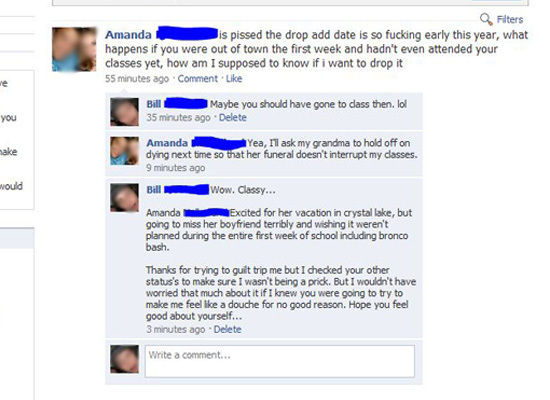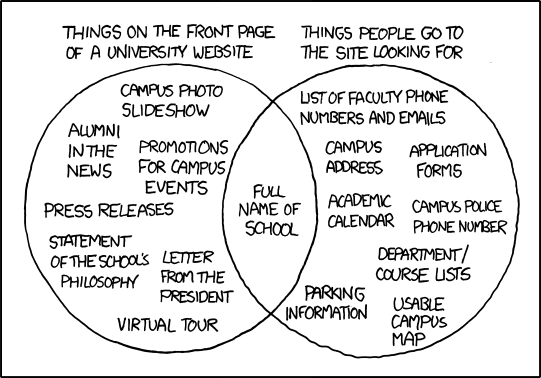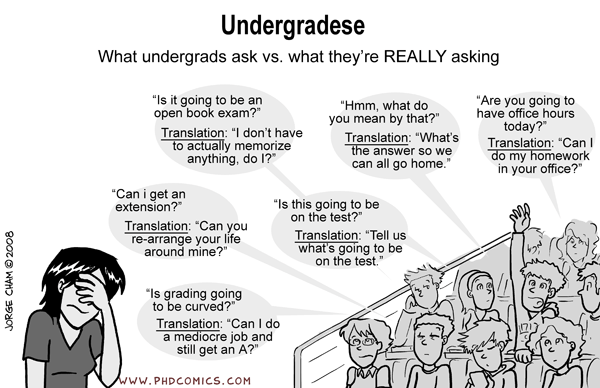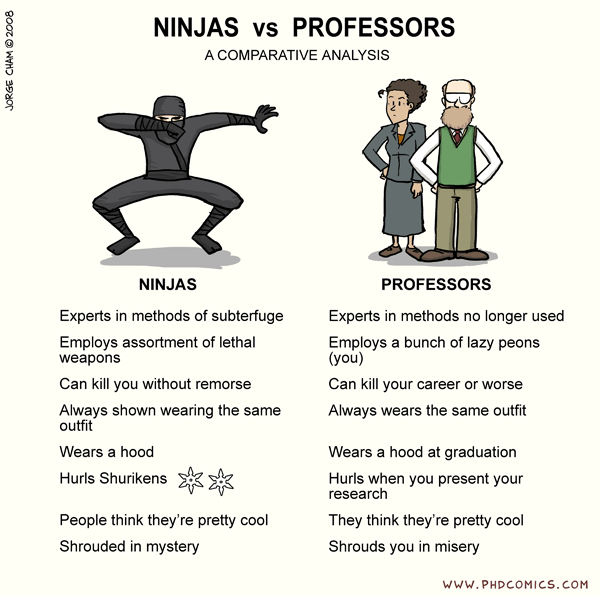- Walking in to class late while holding an uninterrupted conversation not related to the class.
- texting
- walking in late holding a fresh coffee.
- being consistently late (classic passive aggressive behavior - sends clear message to teacher and class)
- Sleeping in class.
- sexually inappropriate behavior (groping, disrobing, whispering, and any exchange of bodily fluid of any kind).
- ?
Monday, August 15, 2011
SQUIRREL!
the no sshls rule

- What behaviors in class qualify as jerkwadish? Why? How do the affect the class?
- Does every class have jerkwads? What percent of the school population in general are jerkwads?
- What about teachers? What behavior have you seen in instructors that qualifies as jerkwadish?
- Is it merely manners? Are manners related or not and how or why?
-
Sunday, August 7, 2011
Funny because it's true...
 Got this from a post on the funniest facebook fails, but something very much like it has happened with one of my students.
Got this from a post on the funniest facebook fails, but something very much like it has happened with one of my students.
Tuesday, August 2, 2011
Thursday, July 21, 2011
How to say nothing in 500 words
 Turns out back in the '50s a prof. had some brilliant insight into this. I've only just scanned it - but it comes highly recommended by a colleague.
Turns out back in the '50s a prof. had some brilliant insight into this. I've only just scanned it - but it comes highly recommended by a colleague.The writer's job is to take a boring idea, and make it interesting.
Tuesday, May 10, 2011
The problem with a social D
The National Institute for Literacy estimates that 47% of adults (more than 200,000 individuals) in the City of Detroit are functionally illiterate, referring to the inability of an individual to use reading, speaking, writing, and computational skills in everyday life situations. We also know that of the 200,000... approximately half have a high school diploma or GED...Some people, particularly students, sing the praises of the social pass - giving a low passing grade to students who have a score in the high 50%'s, but manage to show up the minimal number of times. I suspect this happens more with students who take the pass fail option - because they shoot for a 60% and we all know that the lower our expectations, the lower our performance.
A boss at a former school I taught at explicitly discouraged giving D's. This partly because novice teachers tend to worry about their students' grades more than the students do. When a new teacher, a GTA or someone insecure in their job gives a D it often means the student earned an F but the teacher lacked the confidence to enter that grade.
I don't think too many students expect the social D, but the few who do cause most of a teacher's problems.
Wednesday, April 27, 2011
Finals schedule
This reminds me of a classic XKCD cartoon. Include Finals Schedule for something people would look for - which the search engine couldn't even find.

Monday, April 25, 2011
Rules for beginning writers.
1. Do not write long sentences. A sentence should not have more than ten or twelve words.They found it here. I agree with Cory Doctorow that these rules should not be absolute - with the exception of # 4. What will it take for people to use the dictionary? And yet when dictionary is used - will they resist the impulse to cite it as a source?2. Each sentence should make a clear statement. It should add to the statement that went before. A good paragraph is a series of clear, linked statements.
3. Do not use big words. If your computer tells you that your average word is more than five letters long, there is something wrong. The use of small words compels you to think about what you are writing. Even difficult ideas can be broken down into small words.
4. Never use words whose meaning you are not sure of. If you break this rule you should look for other work.
When a toddler announces to a dinner party that they have pooped and wiped themselves, we find it acceptable and even cute. When an adolescent does the same - not cute and only acceptable if we have very low expectations of said adolescent. We expect students to use dictionaries and encyclopedias, but we don't look for that as sources on papers.
Monday, March 7, 2011
On word count and length requirements
If you've played a sport - or studied a martial art - consider this analogy. In basket ball or football coaches routinely ask their players to run sprints, where (in Bb for example) they run from baseline to touch the free-throw line, then return and touch the baseline and then run to touch the mid-court line, return to baseline, sprint to far court free throw line, back to baseline then run full court and back. This completes one cycle. Different teams may have different names for the drill, but the drill is repeated multiple times in a practice. [update: most common name according to students - suicides]. Football will use the grid lines on the field and go 10 yrds and back, then 20 yrds, etc.
These drills develop agility, build endurance and foster team dynamics. But players don't enjoy them.
What would a coach do, if asking players to run 5 cycles, a player runs just 1 or 2, then says, "Well coach. You get the point. I think I've shown I understand the drill. I like to be concise."?
Or imagine if you study martial arts, like: wrestling, kung-fu, karate, aikedo or the like. When the coach/teacher (and in Asian martial arts the coach is addressed as "teacher" - Sensei means teacher in Japanese, Lao Sher means teacher in Chinese - these cultures respect teachers as much as Americans respect coaches) - when a new move is taught the coach/ teacher will ask the student/ athlete to repeat the move multiple times - or for a set period of time - say 5 minutes. This builds muscle memory and as well ties verbal and visual instruction to physical movement - which creates neural pathways that make permanent the memory and facilitate recall.
What would a martial arts instructor do if the student/athlete did one repetition and said, "That's enough. I get it. I won't do any more"?
Having participated in formal athletics - and been a scholarship athlete in a martial art - I am hard pressed to remember an example of a student questioning a coaches request for repetitive action, though martial arts instructors are famous for stepping in and working on the move in question with students - which when studying a pugilistic sport, may amount to a butt whipping.
Why is there reluctance to meet minimal length requirements? Colleagues I worked with at KU would simply fail or not grade a paper that failed to meet any minimal requirement. This seems logical.
How can we address rhetoric and grammar, and be fair to all students, if most follow directions and take the necessary risks involved with engagement with the assignment - but some take far fewer risks, and disclose much less information?
Friday, January 14, 2011
Managing distractions
She elsewhere uses a colorful / NSFW analogy (see last 3 paragraphs) to note that we don't check technology while engaged in sexual congress, because it's fun and interesting. We use it when we're bored and want stimulation. I'd like to add to thoughts.If you are having sex, you have a good sense that very few emails in the whole world need your attention right then. If you are at a birthday party for ten year old boys and they are screaming up and down a soccer field, you are probably bored and emails look a little more enticing. This is not about addicted or not addicted; this is an issue of knowing when email is essential and when it's a distraction.
You have probably been out to dinner with friends and they checked their Blackberry. This means you are not their most important priority at that time, just for that moment. You of course hope that your presence would make you most important, but in fact, it did not. Does that mean your friend is addicted to her Blackberry? No. It means your friend is prioritizing and she's letting you know that .
- Being plugged means you will miss some of the subtle and not so subtle joys of life. Parents texting during a soccer game will miss seeing their childscore goals and students on facebook or texting during class will miss information and fun
- learning requires quiet reflection. Sometimes we need to be disengaged from the constant bombardment of stimulus to be open - to give our minds the space we need to move ideas around and rearrange our thinking.
Tuesday, November 30, 2010
Worth the Read: Applied Andragogy
however depraved his behavior may have been in other respects, at least in my eyes, his practice as a teacher was grounded on respect. He didn’t tell us what to think. He didn’t manipulate us. He exemplified a phenomenon — a certain kind of caring about literature, and language, and argument — and he trusted us to form our own judgments about that phenomenon.You’d have to be a fool to send your kids to school to learn what the teacher thinks or believes. So said Augustine, who, like Plato, believed that you can’t teach knowledge by telling. What a good teacher can do is afford his or her pupils an opportunity to learn something, not by telling, but by enabling something to be seen, experienced, learned.......Politicians — at least the politicians in this American culture we live in — use words not to communicate, or to argue, or persuade. They pretend to do this. But they don’t. Politicians, like sales people, are interested in outcomes. They want to influence you and they are interested in your beliefs and attitudes only in so far as these are potentially levers they can manipulate
Monday, November 29, 2010
Since no one reads student email, & I can't cut & paste into the LMS
A note from the Registrar re: Transcript Requests
At the end of the semester, we receive thousands of last minute requests from students who want their transcript sent to another institution as soon as grades are posted.
Students should submit their transcript request early to ensure timely processing. The Records Office will enter these requests in advance and schedule the transcript to be printed immediately after final grades are posted.
Sunday, October 24, 2010
reflection on TBL: FA 2010
There seems to be more misunderstandings due to errant expectations this semester. We need to review how college is different from High School (see link for the brilliant comparison contrast by SMU). We had a quiz over this the first week. For example
Professors may not follow the textbook. Instead, to amplify the text, they may give illustrations, provide background information, or discuss research about the topic you are studying. Or they may expect you to relate the classes to the textbook readings....Professors expect you to think about and synthesize seemingly unrelated topics.It surprised me that several students said they didn't learn anything about composition from the TBL project. That was on the rubric as a goal.
High schoolers read short assignments, and can expect the teacher to cover the homework and explain it. In fact many don't need do assigned readings, but will expect the teacher to correct or explain missed homework. In college the onus is on the student.
Also, high school teachers will remind you when you don't turn in work, and when assignments are due. That's not the expectation of a college teacher. I have been doing this, but it seems wrong and unfair because 5% of the students take up almost 50% of my time and cause 85% of the aggravation. And it bothers me that some students who appear to be struggling haven't come to see me, even when I ask them to. The SMU site goes on to say:
[In High School] teachers approach you if they believe you need assistance. [While college] professors are usually open and helpful, but most expect you to initiate contact if you need assistance.Also
[High School] teachers are often available for conversation before, during, or after class. [But college] professors expect and want you to attend their scheduled office hours.
Composition classes are gateway classes. Much of what we teach in Comp 1 is really academic readiness or life skills. In Mary Sherry's "In Praise of the F Word," she argues that for real learning to happen, failure has to be an option. This may not happen in high school if you show up most of the time, but it the work world, and in college failure happens and we learn from it.
3 people complained that they did too much of the work, and that it caused resentment or friction. Comments made by others in their groups lend credibility to their concerns. Because these were students identified by their teammates as leaders and hard workers, it rings true. Several of the harder working students complained that people in their group "goofed around on the computer" during class instead of staying on task and getting work done in the classroom. This is the first time I've run this project in a full computer lab. This bears study.
Most groups had problems meeting outside of class and this caused friction, which interests me because I instructed for all work to be done on campus during scheduled class time. Groups made inappropriate use of classtime, assuming they could meet outside of class. This happened last semester too. I talked about it in class.
Several groups didn't submit readable/viewable video. I offered use of my camera - no one said they needed it.
1/3 said the amount of time was appropriate, and 1/2 said they needed more time. Many of the people who said the amount of time was appropriate (or in one case too long) come from groups that didn't produce functional video and missed other deadlines.
At the begining of the semester we did an icebreaker where we chose what we would be if we had to be reincarnated. I disproporianate number of both my classes chose power-dominant images. In the decade or more I've been doing this icebreaker I've only had this many power-dominant images chosen twice. Both times it was a challenge to teach the class, but in one case the class experience was ultimately one of the most rewarding teaching experiences I've had.


